Why Sam Shepard Has “The Right Stuff”
The following is excerpted from remarks made by Bay Area–based film director Philip Kaufman (The Right Stuff, Invasion of the Body Snatchers, The Unbearable Lightness of Being) at “SamFest,” held by the Magic Theatre in May 1998 in honor of Sam Shepard. The article was originally published in the now-defunct San Francisco Examiner Magazine on February 21, 1999.
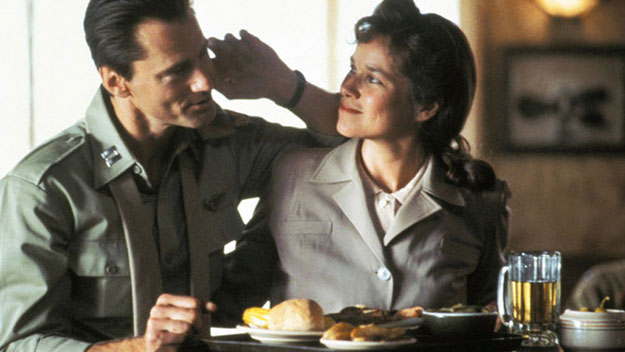
The Right Stuff
I was writing the screenplay for The Right Stuff. In his book, Tom Wolfe kept talking about a certain quality… a quality that could never be mentioned: “There was something ancient, primordial, irresistible about the challenge of this stuff, no matter what a sophisticated and rational age one might think he lived in… Perhaps because it could not be talked about, the subject began to take on superstitious, even mystical outlines. A man either had it or he didn’t! There was no such thing as having most of it… The man who truly had it could ignore the rules… he would challenge all the limits…” This quality was a kind of Righteousness, but underneath it there was this Elusiveness. And all I could think about was how do you visualize… Elusiveness…?
Right about then, Rose [Kaufman’s wife] and I went to the Intersection, when it was over on Union Street, to hear Sam read some of his poetry. There he was, this tall, string-bean kinda guy in a leather jacket reading that… elusive poetry. Afterwards Rose said: “Well, there it is. Sam’s your man.”
“Yeah. But they’ll never go with him, Down There.” (“Down There” is you-know-where.)
To which Rose replied: “Sam’s your man.”
So… I said to Sam, “Sam, how’d you like to be in The Right Stuff?” And Sam said, “Unhunh. No thanks.” And I said, “How come?” And Sam said, “Not my cup of tea.” Sam bid me good night, and that was that.
And Rose said, “Sam’s your man.”
So I saw Sam again and I said, “How come?” again. And Sam said, “Well, I dunno. Maybe it’s ’cause I hate flyin’.” “You’re scared of flyin’?” I said. And Sam’s eyes got that kinda mean, snaky look, “I didn’t say I was scared of flyin’.” And then he was gone.
And Rose said, “Definitely your man.”
Sam’s staying at the Chateau Marmont… Down There… and so I get the room next to his, and I… slide the script under his door. And I wait there in the hallway of the Chateau Marmont, and pretty soon I see the script slide the rest of the way, and I hear the envelope being ripped open.
Next day I see Sam and he says, “Ya wanna grab a bite to eat?”
So we go next door to the Imperial Gardens, back then in the early days of sushi, to that same restaurant where Henry Miller used to hang out when he was looking for Hoki or Brenda Venus, and… but that’s all another movie… and so anyway Sam says, “OK.”
And I say, “OK? By OK you mean ‘yeah’?”
And Sam nods. “I’m your man… Maybe.”
So anyway I tell all the people Down There, and they say, “We’ll never go with him.”
And I say, but he was so great in Days of Heaven.
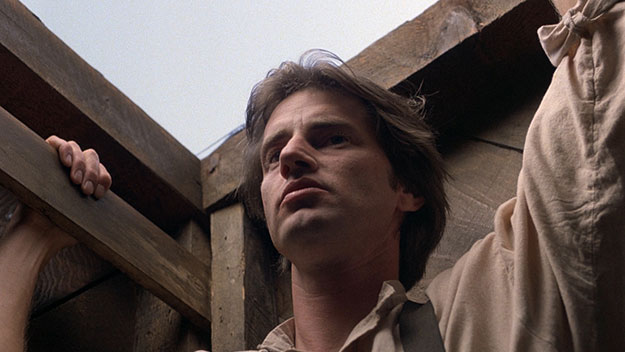
Days of Heaven
And they say, “So what? It didn’t perform.”
And I say, “Whaddya mean? It performed fine for me.”
And they say, “We’re talkin’ profits.”
And I say, “Profits? We’re talking about The Right Stuff here.”
And they say, “You wanna go into turnaround!?”
“Turnaround” is a word they use Down There. I been in Turnaround plenty, and the feeling you get in turnaround is the feeling that Lot or Orpheus musta had when they got put in turnaround… Down There.
But I said, “Unh unh. I don’t want turnaround… But I want Sam. Sam’s my man.”
Well, miraculously, they folded. They said, “You gotta get him for a price.” I said, “I’ll get him for a price.” I felt kinda like a bounty hunter. But I’d always seen The Right Stuff as a kind of Western. As I was leaving, I overheard someone saying, “If it doesn’t work we’ll get that putz later”… But that’s another story.
So I rush to tell Sam he’s my man and even before I can get him for a price, he says, “Well y’know, I been thinkin’ it over…” And there’s just this long pause.
And I say, “Aaahmm? What does that mean, you been thinkin’ it over, Sam? Does that mean you don’t want to do it?”
And Sam says, “I didn’t say that. But maybe I ain’t this guy.”
“Sam! You’re this guy! You’re my man!”
“Maybe.”
Next thing I arrange a meeting with Chuck Yeager, “the Ace of Aces,” the only man who truly has the Right Stuff. General Chuck Yeager is, as Tom Wolfe describes him, “a short, wiry, but muscular little guy… with a tough looking face that seemed (to strangers) to be saying ‘You best not be lookin’ me in the eye, you peckerwood, or I’ll put four more holes in your nose.’”
Now apparently Yeager had not taken too kindly to Tom Wolfe’s description of him… and he’s adopted a kind of wait-and-f—-n’-see attitude. We’re in a loft South of Market where the models are being made and the storyboards are all up on the walls. Sam doesn’t show up. General Yeager arrives right on time, but Sam’s nowhere to be seen. Yeager’s pacing around, giving me his famed peckerwood glare when finally Sam arrives and says he musta overslept… Or somethin’… Which I guess is why Sam didn’t get to comb his hair… or shave… or anything like that.
“Sam, meet General Chuck Yeager.” Sam towers over Yeager and I get the feeling that Sam doesn’t particularly like the part about the General, as he looks down and says, “How’reya doin’?”
Sam’s got his snaky-eyed look and Yeager’s got his peckerwood-glare.
The General pulls me off to the side and says, “You Hollywood guys.”
“Whaddya mean, ‘You Hollywood guys,’ General?”
“Jus’ like I figgered. This guy ain’t me. He ain’t even close.”
“He’ll become you, General. This guy’s a… a great writer… You oughta read his stuff.”
“I tried ta… not my cup a tea.”
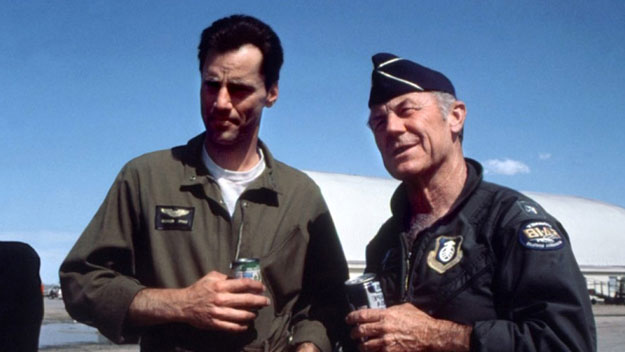
The Right Stuff
“But he’s an actor. He’s gonna become you, General…”
“…Chuck”
“…General Chuck, but he’s gonna become you in a… sorta Gary Cooper kinda way.”
I can tell Gary Cooper strikes a soft spot with Yeager; and while he’s digesting that I drag him over to Sam, who’s gotten absorbed in the storyboard pictures. And I say…
“Right here, this is where he… you, Sam… Yeager breaks the sound barrier and he… you… Yeager says: “Say Ridley… make another note, will ya? There’s something wrong with this ol’ machometer… it’s gone kinda screwy on me.”
Sam’s perkin’ up a little bit. He doesn’t have that mean, snaky look anymore. He’s got a kind of… bemused… snaky look and he says, “That really how it was, Chuck?”
And Yeager says, “That’s kinda how it was.” And then he adds, “These Hollywood boys always gotta take a few liberties here and there.”
And Sam says, “Yeah, they do.”
And I’m kinda quiet, thinking I really don’t need all this s–t. When suddenly Yeager opens up, “But y’know I understand all that. They gotta sell their product.”
I never suspected back then that the Ace of Aces, the unsung hero, was gonna be all over the TV selling Delco batteries and other products after the film came out… But that’s another story… In this story, right then Yeager said, “Y’see Sam, this here’s how it really happened…”
And Sam leaned in, and right then and there something clicked. And pretty soon the two of them were talking away with one another, going from picture to picture. If I were Tom Wolfe I mighta said what was going on here was “ancient, primordial… irresistible…” But truth to tell, I was just feelin’ kinda relieved that they were hitting it off. But… more truth to tell…I was also feeling kinda… left out.
So that’s pretty much the way it was between Sam and Chuck from then on. Best of friends, mutual respect. It was like Sam had found a father to go along with the other one that was out there somewhere in the Southwest. The elusive one.
So it seems like everything’s going along great, and I’m concentrating on getting the other 134 speaking parts cast, trying to work out special effects that have never been done before in film, flying around finding locations, dealing with one disaster after another, working on a very tight budget with constant enormous pressures from Down There. And we begin in San Francisco and shoot for months (working with all sorts of San Francisco people, many who’d worked at the Magic Theatre, I might add: Ed Harris, Fred Ward, Kathy Baker, to name a few). Shooting out of sequence, doing the later parts of the film first. And then we move down to Edwards Air Force Base, and we’re all set up out in Pancho’s Fly Inn, that godforsaken rat shack in the high desert where the test pilots hung out, shooting the scene where Yeager gets recruited to break the sound barrier. We’re shooting with John Lion, and Tom Dahlgren, and Jim Haney, some more of our Magic Theatre ensemble, and we come to Sam’s first lines… Suddenly I sense something’s wrong.
And I go over to Sam and I say—off to the side and softly—“The voice, Sam.”
And Sam says, “What voice?”
“You know, the voice with the accent, Yeager’s accent, the centerpiece of Tom Wolfe’s book, the one Tom says every pilot has, that “poker-hollow West Virginia drawl, the drawl of the most RIGHTEOUS OF ALL THE POSSESSORS OF THE RIGHT STUFF”… That voice!”
And Sam says, “Naw. I ain’t doin’ that.”
“How come, Sam?”
“That’s just actor stuff.”
“Whaddya mean?”
“I mean it don’t necessarily have anything to do with the rightness of things.” And Sam’s looking at me with those snaky eyes.
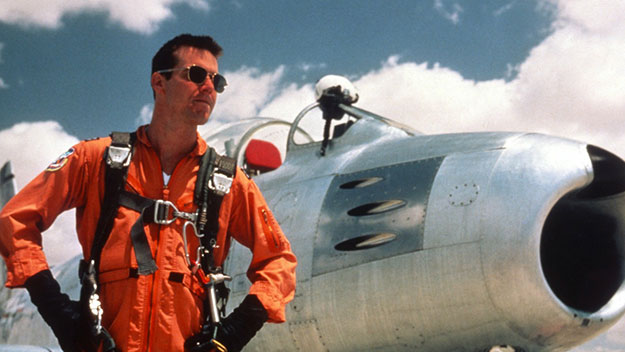
The Right Stuff
There’s hundreds of people waiting around. I had counted something like 130 Teamsters alone that had been carted up to the high desert. The sun’s burning away outside, the other actors are sliding slowly away, the clock is ticking.
I decide to do another rehearsal.
And then, as Sam gets to that line where he says, “I’ll be there,” it comes to me. It’s not the voice… maybe it’s because Sam’s got a great EAR. The Ear is in all his work. It’s in his poetry. It’s in his plays. It’s in his music. It’s not about voice or accent… it’s about Ear… and… attitude… Or something more elusive. Whatever it is, Sam’s got it. And now that I’m hearing it, he’s right… it sounds right!!! Sam’s doing this like Gary Cooper! After all, did Gary Cooper ever use an accent?
That’s what I said to Sam afterwards, and Sam said: “Gary Cooper? He’s just some kinda cowboy actor.” It turns out Sam really didn’t have Gary Cooper in mind at all. He didn’t even think much of him as an actor. I think Sam always secretly wanted to play Chester in Gunsmoke.
But I stayed with Gary Cooper. Anthony Mann had told me many years earlier: “You know what a scene in a movie is? Gary Cooper on horseback, that’s a scene.”
And that’s what I had in mind when Sam/Yeager rides across the high desert and looks down at that little orange X-1 plane steaming on the desert floor like the bronc that can’t be broken, and Sam looks back with those eyes, those snaky, bronc-breaker eyes, and you know that a showdown is at hand. And when Tom Wolfe saw it, I’m told he jumped out of his seat, because there it was: the meeting of past and future, of horse and machine, of Western and space… And I was feeling good about all that when in the next scene Sam and I had our first real confrontation.
He’s headed over to Pancho’s for a drink. And I’ve got the camera set up and about a quarter mile down the road is Pancho’s.
“Sam, I’d like you to ride fast down to there.”
Sam looked down the road and his eyes got snaky. “How fast?”
“Pretty fast.”
“You sayin’ like a gallop?”
“Yeah, gallop’d be good. Even a fast trot.”
“Well, which is it?”
“Gallop.”
“I’d never gallop my horse there. You know anything about horses, you know you don’t ever gallop your horse home.”
“Well, you got me there, Sam. I don’t know much about horses, but I do know somethin’ about film and about how this film’s going to be edited, and a quarter mile’s a lot of screen time, and I want you to do it as quickly as you can… as you reasonably can, Sam.”
“Unhunh.”
“Just ride the f—–g horse fast, Sam!”
As we stood there, the blazing sun began to set. The other actors were sliding away. The clocks were still ticking. And then it came to me.
“Hold on, Sam. You say you’d never gallop your horse home.”
“Damn right.”
“But that ain’t home. That’s Pancho’s. That’s where you drink. Home’s someplace else.”
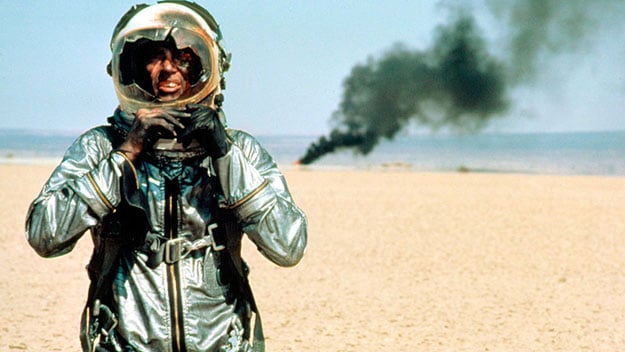
The Right Stuff
Sam thought about that for a moment, then he said, “Well, let’s shoot the damn thing.” And I said “action” and he set out for Pancho’s at a pretty good clip. In the editing we put some Bob Wills music over it and it came out fine. Sam just had to feel the rightness of things.
That same sense of rightness… or righteousness, in Sam came out a few days later when some guys in suits showed up on the set and started putting the squeeze on me. Now these were a pretty tough and determined group of guys, and I was getting pretty dangerously steamed up with them when Sam appeared. He had his shirt off, a lasso in his hands—I think he was writing for Fool for Love or Motel Chronicles—and he had been interrupted by our shouting. He walked right up to the head guy and said right into his face like he was gonna put four more holes in his nose: “These guys givin’ you any trouble, Phil?”
There was a long pause and then the guy said meekly, “No, we’re not.” And the problems were resolved right then and there.
That same side of Sam revealed itself sometime later in the Tosca Cafe. Jeannette Etheredge, its proprietor, had been the real-life Pancho Barnes of the film. And to this day, a figure from Pancho’s bar stands behind Tosca’s bar and the secret backroom is lined with pictures of us all from those days. Tom Wolfe said Pancho Barnes was tough, “but she was anything but Low Rent.” Everybody respected Jeannette… except one guy late one night who was treating her like she was low-rent. And Sam said, “This guy givin’ you any trouble, Jeannette?” Only this guy said, “Who the f–k are you, cowboy?” So… Sam decked him with a punch and on his way down, Ed Harris happened to light fire to the guy’s hair. And that’s how come there’s no more smoking in the Tosca Cafe.
You want to know the one other time Sam and I disagreed? It was in his last scene in the film where Yeager tries to break the Russian altitude record and his plane freezes up and he has to eject and we don’t see his parachute open and we’re pretty sure he’s bought the farm. And the lone ambulance makes its way across the high desert toward the black smoke when suddenly the distant figure of Sam/Yeager emerges from the heatwaves of the desert carrying his parachute. And the ambulance driver says: “Over there. Is that a man?” And Levon Helm says, “You bet it is!”
And we move in to do the close-up. Sam/Yeager’s face is bleeding, his skin is charred black and still smoking. He’s like an apparition, a ghost. And as we do the first take… I see Sam is chewing gum. “Sam, the gum!”
“What about it?
“Sam, you just fell from 26,000 feet. You ejected, you broke your helmet on the canopy, you’re burnt, bleeding, barely alive and you’re still smoking. If you chew gum, people’re gonna laugh.”
And Sam said: “No they ain’t.”
I stood there for a moment in the blazing sun, the clock was ticking, everyone was sliding away, Sam was putting in a fresh stick of Beemans; and then it came to me. He was Icarus, and he was Yeager, and he wasn’t Gerald Ford. This guy could fall out of the sky and chew his Beemans at the same time; because he… had that certain quality. In fact it kinda visualized that quality Tom Wolfe had been talking about: that Elusive quality. And so I said, “Action.”
At the end of the shooting I saw a big envelope slide under my door. I thought I could hear him waiting out there in the hallway as I ripped it open. It was a manuscript of that book he’d been writing during shooting—Motel Chronicles. On the title page Sam had written: “Phil, It’s been Righteous, brother. Sam, Sept. 1982.”
When I opened the door, he was gone.







